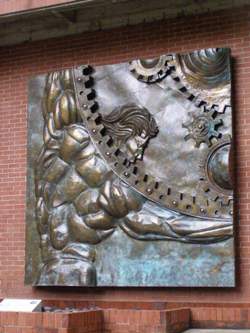 Think
tanks and the academy, in all likelihood, were united at birth. When
Plato started his famous academy, his goals included deep philosophical
discussions and leadership training. His academy lasted approximately
nine centuries (400 B.C.-529 A.D.). The oldest university within
Western traditions, the University of Bologna was started in 1088 out of
the demands and needs of a collection (a university) of foreign
students.
Think
tanks and the academy, in all likelihood, were united at birth. When
Plato started his famous academy, his goals included deep philosophical
discussions and leadership training. His academy lasted approximately
nine centuries (400 B.C.-529 A.D.). The oldest university within
Western traditions, the University of Bologna was started in 1088 out of
the demands and needs of a collection (a university) of foreign
students.During the second half of the last century several efforts that started as think tanks developed into well respected universities. The Centre for Research and Communication in Manila, Philippines, founded by two Harvard graduates in 1967 gave birth to the University of Asia and the Pacific, which received its official status in 1995. In South America, the Torcuato Di Tella Institute, founded in 1958 in Buenos Aires, Argentina, transformed itself into the Universidad Torcuato Di Tella (UDT) in 1991. It is ranked consistently in the top 100 Latin American universities. Centro de Estudios Macroeconómicos de Argentina (CEMA) a think tank founded in 1978 and directed by “Chicago Boys” became the CEMA University. It is also ranked very high among universities focusing on economics. While UDT is more aligned with the Keynesian status quo, CEMA professors are inspired by Chicago and other schools of thought more skeptical about the benefits government intervention. In Brazil, the Getulio Vargas Foundation, founded as a think tank in 1944, developed into a major “mainstream” university-think tank complex, with a budget of over 400 million dollars.
In Guatemala the core of the group of businessmen and local leaders who started the Centro de Estudios-Económico Sociales think tank in 1958, founded the Universidad Francisco Marroquin (UFM) in 1971. UFM has turned into a major disseminator of free-market teachings. Its New Media portal serves as a repository of some of the world’s best material, mostly in Spanish, of the great Classical liberal books and video-taped lectures.
In the cases described above, after the founding of the universities, the think tanks became a secondary focus of donors and trustees. Both CRC and CEES still have their offices within the university premises. Taking advantage of the extended college community, they continue to produce research and educational products.
Other universities were started as complete separate entities by the same leadership teams that developed think tanks. In Chile, several trustees and directors of the Libertad y Desarrollo institute, one of the leading think tanks in the Americas, started the Universidad del Desarrollo. This university attracts over ten thousand students. Fifteen percent of them come from abroad. In England, the late Ralph Harris and Harry Ferns, of the Institute of Economic Affairs, (IEA) helped found the University of Buckingham. The University credits the IEA for playing an important role in its development. In Europe, Gabriel Calzada, who in 2005 founded the Instituto Juan de Marianain Spain, recently launched the Online Manuel Ayau University OMMA.
What about the U.S. scene? Several think tanks are already developing “university” type products. Among them:
- The Ludwig von Mises Institute, in Auburn, Alabama, has been hosting their Mises Universitysince 1986. The one week course focuses on Austrian economics.
- Cato Institute has its Cato University, usually taking place at the end of July.
- A recent entrant to this market, the Acton University, organized by the Acton Institute, Grand Rapids, Michigan. Last year it attracted close to 800 students and professors from approximately 80 countries. It is the most international free society educational program in history.
- The Atlas Network hosts a Think Tank MBA course for talented intellectual entrepreneurs, as well as a “leadership academy” as an online course to help enhance think tank talent.
The new global scene and the new technologies are changing the optimum size of educational institutions. The lessons from Plato’s Academy, which took place in a garden grove near Athens, had an enormous impact on civilization. The evolving scene in higher education and the growth of think tanks will lead to new educational offerings that will have a major impact on the quality and quantity of policy studies and public policy education.
* Alejandro Antonio (Alex) Chafuen, Ph.D., has been president of Atlas Economic Research Foundation since 1991. A member of the board of advisors to The Center for Vision & Values and a trustee of Grove City College, he is also the president and founder of theHispanic American Center of Economic Research. Dr. Chafuen serves on several boards including the Chase Foundation of Virginia, the Acton Institute, the Fraser Institute (Canada), and is an Active Honorary Member of the John Templeton Foundation.
No hay comentarios.:
Publicar un comentario